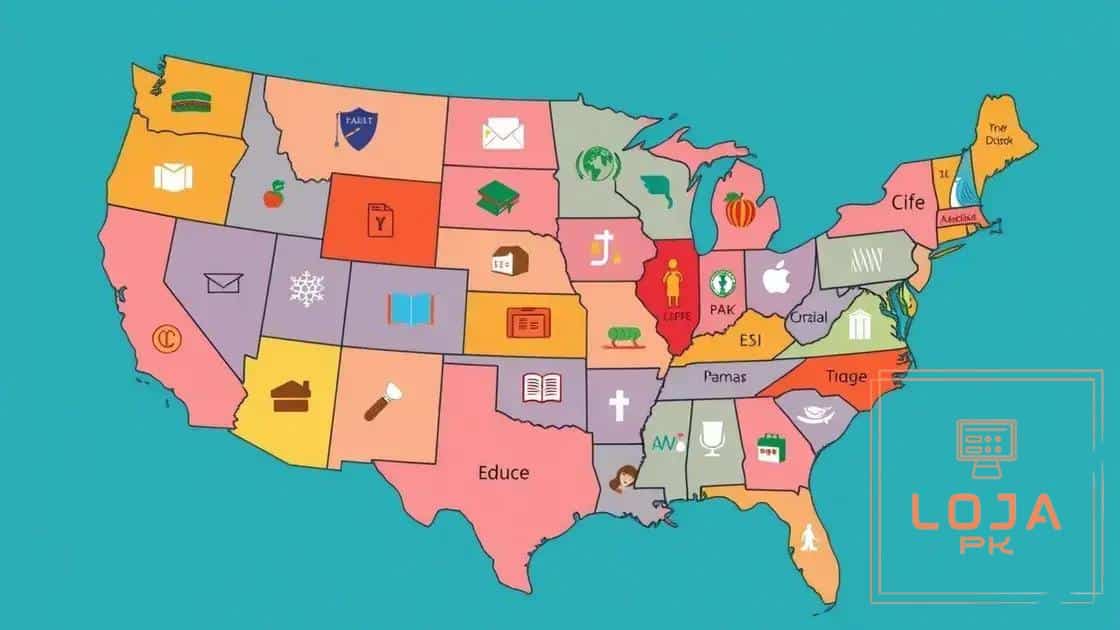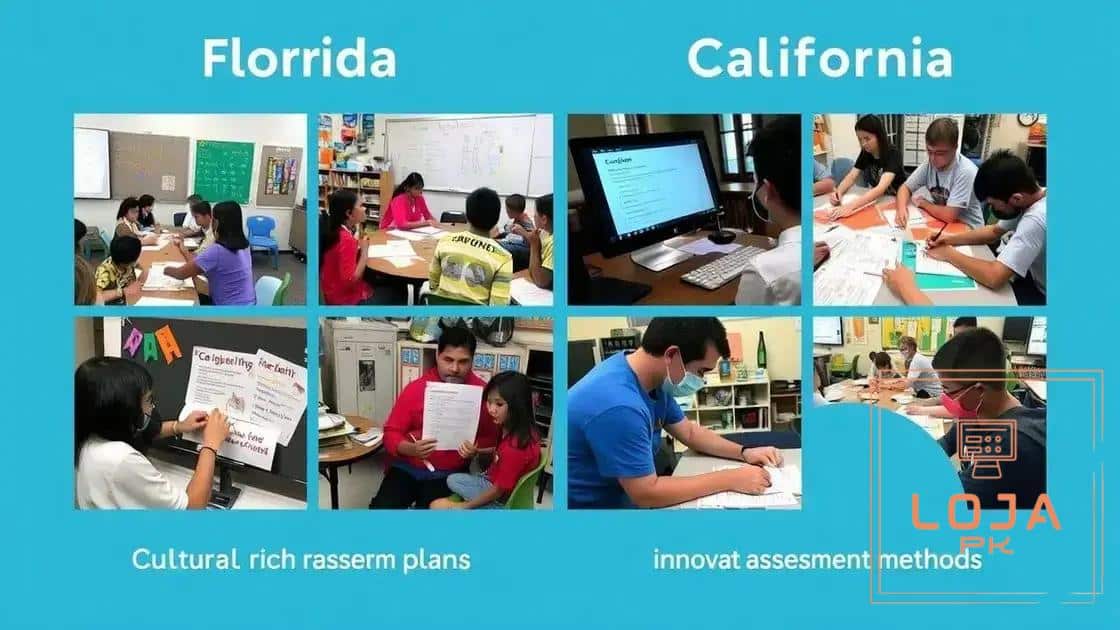States challenge federal curriculum standards: what you need to know

States challenge federal curriculum standards to create customized education approaches that reflect local needs and priorities, enhancing student engagement and learning outcomes.
States challenge federal curriculum standards more than ever, as education evolves and regional needs shift. What does this mean for teachers and students? Let’s dive in!
Understanding federal curriculum standards
Understanding federal curriculum standards is essential for teachers and educational administrators. These guidelines serve as a framework that shapes what students learn in schools across the country. Federal standards aim to ensure that all students receive a high-quality education that prepares them for future success.
What Are Federal Curriculum Standards?
Federal curriculum standards outline the necessary skills and knowledge that students need at various grade levels. These standards are developed by education experts and are intended to promote consistency across states. They help align educational goals with assessment expectations, ensuring that students are prepared for college and careers.
Importance of Federal Standards
Adhering to federal curriculum standards is significant for several reasons:
- Ensures a consistent education across the nation.
- Helps students build a foundational knowledge base.
- Facilitates accountability for school performance.
By following these standards, educators can create a cohesive learning environment, fostering academic achievement. Additionally, they provide a framework for evaluating student progress and school effectiveness.
Moreover, federal standards serve as a guideline for states when developing their own curriculum. While states have the flexibility to adapt these standards, federal guidelines offer a starting point. This balance helps address local needs while maintaining a high educational quality.
Understanding these concepts allows educators and policymakers to navigate the evolving landscape of education effectively. It’s crucial to stay informed about any changes or updates in these standards to ensure that all students have access to robust educational opportunities.
How states are challenging these standards

States are actively challenging federal curriculum standards as they seek to address local educational needs. This challenge reflects a growing desire for customization in education that considers regional differences and student diversity.
Reasons for Challenging Federal Standards
Different states have unique educational priorities, prompting them to reassess how federal standards apply. A few reasons include:
- State demographics differ, requiring tailored educational approaches.
- Local industries and job markets shape the skills students need.
- Community values influence educational content and priorities.
As a result, states are experimenting with alternative frameworks or modifications to existing standards. These actions often lead to innovative educational practices and curriculum development.
Examples of State Challenges
Several states have taken notable steps to redefine their educational goals. For instance, some are implementing:
- Customized curriculum that reflects local culture and history.
- Flexible assessment approaches for student evaluation.
- Innovative teaching methodologies that cater to diverse learning styles.
Through these initiatives, states seek to create learning environments that resonate more with their communities.
The push against standardized federal policies highlights ongoing discussions about local control in education. It raises essential questions about who should decide educational priorities and what those should be. While federal standards aim to create uniformity, state-level adaptations reveal a need for balance between accountability and flexibility.
Implications for educators and students
The implications for educators and students as states challenge federal curriculum standards are significant. These changes not only affect how lessons are taught but also reshape the learning experience for students.
Impact on Educators
For teachers, adapting to new state standards can mean revising lesson plans and instructional methods. Some important implications include:
- Increased pressure to align with state-specific guidelines.
- Opportunities to adopt innovative teaching practices.
- Need for ongoing professional development to stay current.
This shift may lead educators to collaborate more with local communities to create curriculums that feel more relevant to their students.
Impact on Students
Students, too, experience direct effects as curricula evolve. The following aspects are crucial:
- Greater relevance of materials to local culture and context.
- Potential for enhanced engagement in learning activities.
- Diverse evaluation methods that cater to different learning styles.
As education adapts, students might find themselves better prepared for post-secondary opportunities or the workforce. However, there can also be challenges as some may struggle with transitions to new standards.
Ultimately, the implications for educators and students underscore the complexity of balancing federal curriculum standards with state-specific needs. This evolving landscape encourages a more tailored educational approach while still raising questions about equity and access across different regions.
Case studies of states making changes

Examining case studies of states making changes to federal curriculum standards reveals unique approaches and outcomes. Various states are implementing innovative strategies to address their specific educational needs.
Florida’s Customized Curriculum
In Florida, educators have tailored curricula to include local history and culture. This initiative aims to make learning more relevant to students. Schools have seen increased student engagement as a result. Some highlights of this approach include:
- Integration of Florida’s diverse cultural heritage into lesson plans.
- Emphasis on local environmental issues relevant to students.
- Collaborations with community organizations to enhance educational content.
This localized focus allows students to connect more deeply with their learning.
California’s Flexible Assessments
California is exploring flexible assessment methods that meet the needs of all learners. By moving away from a one-size-fits-all testing model, educators aim to promote a more supportive learning environment. Key features of this initiative are:
- Innovative assessments that account for different learning styles.
- Opportunities for project-based evaluations.
- Utilization of technology for personalized learning experiences.
This flexibility helps to foster critical thinking and creativity among students.
By learning from these case studies, other states can adopt or adapt successful strategies to benefit their educational systems. Such initiatives highlight the importance of customizing education to cater to local needs and address specific challenges faced by students and educators.
Future trends in education policy
Future trends in education policy suggest a shift towards greater flexibility and personalization in learning. As states continue to challenge federal curriculum standards, new policies are emerging to better meet the needs of diverse student populations.
Emphasis on Personalized Learning
One significant trend is the movement toward personalized learning. This approach tailors education to individual students’ strengths and interests. Key aspects of personalized learning include:
- Use of technology to create customized learning paths.
- Incorporation of student feedback in curriculum design.
- Support for various learning styles and paces.
This trend aims to enhance student engagement and achievement by making education more relevant to each learner.
Integration of Social-Emotional Learning
Another important trend is the growing focus on social-emotional learning (SEL). Schools are recognizing that emotional health is crucial for academic success. As a result, policies are starting to include:
- SEL programs that teach skills like empathy and resilience.
- Training for teachers to support students’ emotional well-being.
- Strategies for building positive school climates.
By integrating SEL into curricula, schools can promote a holistic approach to education.
Moreover, technology is playing a vital role in shaping the future of education policies. Artificial intelligence and data analytics can help educators understand student needs better and inform curriculum changes. This trend may lead to data-driven decisions that enhance educational outcomes.
Lastly, collaboration between states and local communities will likely increase, fostering innovative solutions to educational challenges. As more states explore unique approaches to curriculum development, the education landscape will continue to evolve.
FAQ – Questions about the impact of states challenging federal curriculum standards
What are federal curriculum standards?
Federal curriculum standards provide guidelines for what students should learn at each grade level across the country.
How are states adapting these standards?
States adapt federal standards by customizing curricula to address local needs, cultural relevance, and community values.
What is personalized learning?
Personalized learning tailors education to fit individual students’ interests and learning styles, enhancing engagement and success.
Why is social-emotional learning important?
Social-emotional learning helps students develop critical skills like empathy and resilience, which are essential for academic and personal success.





